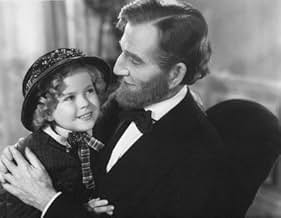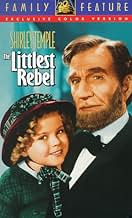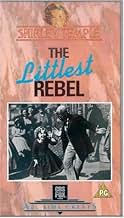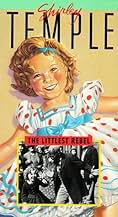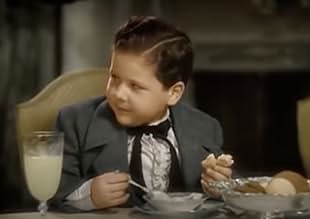Adicionar um enredo no seu idiomaShirley Temple's father, a rebel officer, sneaks back to his rundown plantation to see his family and is arrested. A Yankee takes pity and sets up an escape. Everyone is captured and the off... Ler tudoShirley Temple's father, a rebel officer, sneaks back to his rundown plantation to see his family and is arrested. A Yankee takes pity and sets up an escape. Everyone is captured and the officers are to be executed. Shirley and "Bojangles" Robinson beg President Lincoln to interc... Ler tudoShirley Temple's father, a rebel officer, sneaks back to his rundown plantation to see his family and is arrested. A Yankee takes pity and sets up an escape. Everyone is captured and the officers are to be executed. Shirley and "Bojangles" Robinson beg President Lincoln to intercede.
- Direção
- Roteiristas
- Artistas
- Prêmios
- 4 vitórias no total
- Sgt. Dudley
- (as Guinn Williams)
- Birthday Party Guest
- (não creditado)
- Birthday Party Guest
- (não creditado)
- Black Boy
- (não creditado)
- Party Guest
- (não creditado)
- Birthday Party Guest
- (não creditado)
- Railroad Ticket Clerk
- (não creditado)
- Birthday Party Guest
- (não creditado)
- Birthday Party Guest
- (não creditado)
- Direção
- Roteiristas
- Elenco e equipe completos
- Produção, bilheteria e muito mais no IMDbPro
Avaliações em destaque
Yes, Willie Best's character is an embarrassment when it is not infuriating. There's no arguing that.
But Bill Robinson's character is very different. He is the one on whom Mrs. Cary relies when her husband is at war, he is the one who makes it possible for Cary to get back to see his wife as she is dying, etc. He is also the one who makes it possible for he and little Virgie to get to Washington and, eventually, plead her father's case with President Lincoln. In short, he is the character who makes pretty much everything good happen.
Yes, there is injustice in that he should have received higher billing as a result, and he should have been in the final shot with Temple, as he was as important as her father and more important than Jack Holt. That was unfair, and though probably based on what Fox thought American audiences of the time would tolerate, nonetheless a concession to the racism of the time. But for its time, this movie is remarkably devoid of the "dumb and happy darkie" stereotypes of the time that are so infuriating.
Furthermore, little Virgie never once treats "Uncle Bill" as anything less than an equal. Nor do her parents ever treat him disparagingly.
Race relations in this movie are not perfect. But neither are they stereotypes. There is no point on zooming in on Willie Best's character and going through all the modern clichés of moral superiority, only to dismiss it. The movie deserves better than that.
Yes, the dancing by Robinson and Temple is a wonder. But this movie has other things that are worth examination as well.
Forget what you may have been told about this movie and try to watch it with an open mind. You won't waste your time.
The second is a chance to talk to your children about the way black characters and white characters interact in this film. Some younger children may be confused by the divide between the black characters and the white characters (especially those who attend racially-diverse schools,) but this is a good time to explain to them the racist attitudes of the time period, and ask them how it makes them feel.
The best way to combat racism is not to sweep it under the rug, but to teach children where we were, how far we've come, and how far we still need to go. Give children the credit they deserve, they will understand.
This film is a perfect opportunity to relate to your children and instill guidance.
The story is set on a Southern plantation where Herbert Cary (John Boles) and his wife, Helen (Karen Morley) honor their child, Virginia, better known as Virgie (Shirley Temple), with a birthday party where she and her little guests are gathered together with ice cream and cake along with tap dancing entertainment by Cary's slave/ butler, Uncle Willie (Bill Robinson). Shortly afterwards, the party is disrupted by startling news that war has been declared between the states. Enlisting in the Army, Cary leaves his wife and child under the care of Uncle Willie. With Yankee scouts invading their property, Virgie, while playing soldier, sling shots Colonel Morrison (Jack Holt), addressing herself as a "confederate." In spite of their differences, Morrison, a father himself, takes an immediate liking to Virgie, later rescuing her from the threat of the villainous Sergeant Dudley (Guinn Williams) for not revealing the whereabouts of her "daddy." After the Cary estate is burned to the ground, causing Mrs. Carey to fall ill and die within three weeks time, Cary leaves his post to take Virgie over to Richmond where she's to be placed in the care of her Aunt Caroline. Complications arise when Carey is recognized and captured, separated from his daughter, imprisoned along with Morrison for helping him, each charged with treason and sentences to be executed.
With 20th-Fox specializing in Southern stories set during, before or after the Civil War, THE LITTLEST REBEL is a fine example capturing Southern hospitality and flavor with the reconstruction of plantations and notable songs from that era including "Swanee River" (by Stephen Foster) sung during opening credits; "Turkey in the Straw" (tap dance by Bill Robinson); "Those Endearing Young Charms" (sung by Shirley Temple); "Sometimes I Feel Like a Motherless Child" (by Thomas Moore and Matthew Locke); "Polly-Wolly Doodle" and "Polly-Wolly-Doodle" (sung by Temple and reprized during closing titles).
Of its cast members, Bill Robinson and Willie Best provide lighter moments to their traditional servant roles. Best's performance as a shiftless and comical slave gives the impression that his role as James Henry was actually intended for Stepin Fetchit. While Best doesn't imitate Fetchit's comical methods to the extreme, he works well alongside Robinson as his comic foil doing a brief takeoff in the popular "Amos and Andy" radio show tradition in the question and answer session where Best asks Robinson: "Why is a shoe called a shoe?" Although portraying their roles through stereotypes, Robinson comes through as an intelligent, caring and sensible slave with a talent for dancing. He's very convincing and sincere through his interacting with Temple, which is why they work so well together. John Boles satisfies as the easy-going father turned soldier and accused spy while Karen Morley, despite of her screen limitations, makes due with her role.
Due to controversy in how the black performers are portrayed, cable television revivals of THE LITTLEST REBEL in recent years have been limited, though shown frequently at some point on American Movie Classics (1996-1999), the Fox Movie Channel, and availability since the 1980s on home video and afterwards DVD either in black and white or colorized formats. In May 2006, THE LITTLEST REBEL was one of the films chosen as part of its subject matter of "Black Images on Film" theme co-hosted by author Donald Bogle, where he and host Bob Osborne discussed the film, performances of Robinson and Best, as well as a scene where Temple gets herself corked up to avoid Yankee soldiers.
THE LITTLEST REBEL, along with THE LITTLE COLONEL, were intended as screen entertainment with no intention to offend, yet something to consider as a reflection of the times, and how a Civil War story such as this is seen through the eyes of Virgie Carey, the littlest rebel. (***)
Você sabia?
- CuriosidadesBoth John Boles and Bill Robinson nearly drowned while trying to cross a raging, 15-foot river for an escape scene that was cut from the film.
- Erros de gravaçãoWhen the Union soldiers are caught looting, the commanding officer orders them to be flogged. The US Army according to the "History of the United States Army" stopped flogging at the beginning of the Civil War in 1861--this scene is obviously later in the war as Union forces are occupying the south.
- Citações
Virginia 'Virgie' Cary: [singing] Oh, I eat watermelon and I have for years. Sing Polly-Wolly-Doodle all the day! I like watermelon but it wets my ears. Sing Polly-Wolly-Doodle all the day!
- Versões alternativasAlso available in a computer colorized version.
- ConexõesFeatured in Of Black America: Black History: Lost, Stolen or Strayed (1968)
- Trilhas sonorasPolly Wolly Doodle
(1880) (uncredited)
Traditional
Modified Music by Sidney Clare (1935)
Modified Lyrics by Buddy G. DeSylva (1935)
Sung by Shirley Temple with Bill Robinson
Reprised at the end by Shirley Temple
Principais escolhas
- How long is The Littlest Rebel?Fornecido pela Alexa
Detalhes
- Data de lançamento
- País de origem
- Idioma
- Também conhecido como
- The Littlest Rebel
- Locações de filme
- Empresa de produção
- Consulte mais créditos da empresa na IMDbPro
- Tempo de duração
- 1 h 13 min(73 min)
- Cor
- Proporção
- 1.37 : 1


